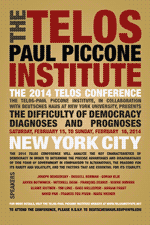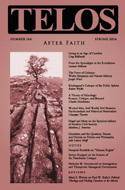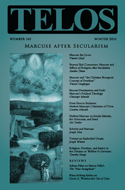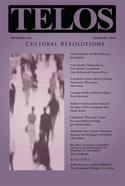By Matthew Bagot · Monday, May 5, 2014 The following paper was originally prepared for the Eighth Annual Telos Conference, held on February 15–16, 2014, in New York City.
 In this paper, I will try to show the positive potential of religion for democracy in light of some theoretical and practical considerations. At the theoretical level, a debate on the proper relation of religion to politics has taken place between certain “liberal” political theorists who are suspicious of religion for good historical reasons and a number of Christian authors who argue that religion can enrich our public life.[1] One such author, David Hollenbach, S.J., bases his argument on an approach to the common good—defined in Catholic teaching as “the sum of those conditions of social life which allow social groups and their individual members relatively thorough and ready access to their own fulfillment”[2]—that he discerns at the Second Vatican Council (1962–65) and calls “dialogic universalism.”[3] In this paper, I will try to show the positive potential of religion for democracy in light of some theoretical and practical considerations. At the theoretical level, a debate on the proper relation of religion to politics has taken place between certain “liberal” political theorists who are suspicious of religion for good historical reasons and a number of Christian authors who argue that religion can enrich our public life.[1] One such author, David Hollenbach, S.J., bases his argument on an approach to the common good—defined in Catholic teaching as “the sum of those conditions of social life which allow social groups and their individual members relatively thorough and ready access to their own fulfillment”[2]—that he discerns at the Second Vatican Council (1962–65) and calls “dialogic universalism.”[3]
Continue reading →
By Russell A. Berman · Wednesday, March 19, 2014 Telos 166 (Spring 2014) is now available for purchase in our store.
 According to the secularization thesis, religious faith should have long ago disappeared, overwhelmed by the forces of progress. Yet while explicit membership in denominational communities is certainly less an obligatory feature of contemporary culture than it was a generation or two ago, modes of religion still play important roles in aspects of social life. This issue of Telos explores some of the ramifications of this afterlife of faith. According to the secularization thesis, religious faith should have long ago disappeared, overwhelmed by the forces of progress. Yet while explicit membership in denominational communities is certainly less an obligatory feature of contemporary culture than it was a generation or two ago, modes of religion still play important roles in aspects of social life. This issue of Telos explores some of the ramifications of this afterlife of faith.
Continue reading →
By Telos Press · Sunday, March 9, 2014 Renewing the West by Renewing Common Sense
July 17–20, 2014
Huntington, Long Island, New York
Announcing a call for papers and plenary session panelists for an international congress to discuss the revolutionary proposal “Renewing the West by Renewing Common Sense”
Location: Seminary of the Immaculate Conception, 440 West Neck Road, Huntington, Long Island, NY 11743
Dates: Thursday afternoon July 17, 2014, to Sunday morning July 20, 2014
Continue reading →
By Vincent Lloyd · Thursday, February 13, 2014 Vincent Lloyd’s “Marcuse the Lover” appears in Telos 165 (Winter 2013). Read the full version online at the Telos Online website, or purchase a print copy of the issue in our store.
 Why has Marcuse’s fame faded? I argue that the answer has to do with the way secularism and critical theory do and do not interact in the contemporary academy. We can read Marcuse as a critic of secularism, when secularism is understood as one of the ideas of the ruling class, taking its current form with the rise of identity politics in the 1960s and 70s. Marcuse criticizes the secularizing features of the Protestant Reformation, much like other recent critics of secularism. Further, he seeks to recover a deeper sense of freedom—what might be called a post-secular sense of freedom. In doing so, he appeals to the good, the true, the beautiful, and, in a way, to rightly ordered love. I read Marcuse fundamentally as a critic of idolatry, as a negative political theologian. His work suggests a promising path for conversations about critical theory and secularism to come together. Why has Marcuse’s fame faded? I argue that the answer has to do with the way secularism and critical theory do and do not interact in the contemporary academy. We can read Marcuse as a critic of secularism, when secularism is understood as one of the ideas of the ruling class, taking its current form with the rise of identity politics in the 1960s and 70s. Marcuse criticizes the secularizing features of the Protestant Reformation, much like other recent critics of secularism. Further, he seeks to recover a deeper sense of freedom—what might be called a post-secular sense of freedom. In doing so, he appeals to the good, the true, the beautiful, and, in a way, to rightly ordered love. I read Marcuse fundamentally as a critic of idolatry, as a negative political theologian. His work suggests a promising path for conversations about critical theory and secularism to come together.
Continue reading →
By Russell A. Berman · Monday, December 16, 2013 Telos 165 (Winter 2013) is now available for purchase in our store.
 To choose Herbert Marcuse and religion as the topic for a special issue might seem strikingly anachronistic. Formed by the collapse of the Weimar Republic and the rise of Nazism, Marcuse worked in the OSS during the Second World War, and later, in his mature theoretical works, such as Eros and Civilization and One-Dimensional Man, he grew into the cultural critic who would become a prominent mentor of the student revolt of the 1960s, especially in the United States and Germany. This is a stirring narrative, no doubt, but does it not simply belong to another era? To be sure, historical distance is hardly an argument against intellectual inquiry, and one could certainly dedicate an issue to filling out a detailed account of how this philosopher became a public intellectual in the context of the upheavals of his age. Yet every historical study of the past also bears the marks of the present, including the question marks that punctuate our own, current queries in this issue of the journal. What does Marcuse have to say to us today? That consideration is always germane, but especially in Telos, which has set for itself the task of developing a critique of the contemporary. To choose Herbert Marcuse and religion as the topic for a special issue might seem strikingly anachronistic. Formed by the collapse of the Weimar Republic and the rise of Nazism, Marcuse worked in the OSS during the Second World War, and later, in his mature theoretical works, such as Eros and Civilization and One-Dimensional Man, he grew into the cultural critic who would become a prominent mentor of the student revolt of the 1960s, especially in the United States and Germany. This is a stirring narrative, no doubt, but does it not simply belong to another era? To be sure, historical distance is hardly an argument against intellectual inquiry, and one could certainly dedicate an issue to filling out a detailed account of how this philosopher became a public intellectual in the context of the upheavals of his age. Yet every historical study of the past also bears the marks of the present, including the question marks that punctuate our own, current queries in this issue of the journal. What does Marcuse have to say to us today? That consideration is always germane, but especially in Telos, which has set for itself the task of developing a critique of the contemporary.
Continue reading →
By Russell A. Berman · Monday, June 24, 2013 Telos 163 (Summer 2013) is now available for purchase in our store.
 Profound change in society may involve shifting control of political power, the character of economic systems, or access to resources, but it can also have to do with the structures of meaning we bundle together in various understandings of culture. This issue of Telos looks at the explosive forces located specifically in the intangible dimensions of culture and how they may play out in revolutionary or counter-revolutionary processes. Profound change in society may involve shifting control of political power, the character of economic systems, or access to resources, but it can also have to do with the structures of meaning we bundle together in various understandings of culture. This issue of Telos looks at the explosive forces located specifically in the intangible dimensions of culture and how they may play out in revolutionary or counter-revolutionary processes.
Continue reading →
|
|
 In this paper, I will try to show the positive potential of religion for democracy in light of some theoretical and practical considerations. At the theoretical level, a debate on the proper relation of religion to politics has taken place between certain “liberal” political theorists who are suspicious of religion for good historical reasons and a number of Christian authors who argue that religion can enrich our public life.[1] One such author, David Hollenbach, S.J., bases his argument on an approach to the common good—defined in Catholic teaching as “the sum of those conditions of social life which allow social groups and their individual members relatively thorough and ready access to their own fulfillment”[2]—that he discerns at the Second Vatican Council (1962–65) and calls “dialogic universalism.”[3]
In this paper, I will try to show the positive potential of religion for democracy in light of some theoretical and practical considerations. At the theoretical level, a debate on the proper relation of religion to politics has taken place between certain “liberal” political theorists who are suspicious of religion for good historical reasons and a number of Christian authors who argue that religion can enrich our public life.[1] One such author, David Hollenbach, S.J., bases his argument on an approach to the common good—defined in Catholic teaching as “the sum of those conditions of social life which allow social groups and their individual members relatively thorough and ready access to their own fulfillment”[2]—that he discerns at the Second Vatican Council (1962–65) and calls “dialogic universalism.”[3]  According to the secularization thesis, religious faith should have long ago disappeared, overwhelmed by the forces of progress. Yet while explicit membership in denominational communities is certainly less an obligatory feature of contemporary culture than it was a generation or two ago, modes of religion still play important roles in aspects of social life. This issue of Telos explores some of the ramifications of this afterlife of faith.
According to the secularization thesis, religious faith should have long ago disappeared, overwhelmed by the forces of progress. Yet while explicit membership in denominational communities is certainly less an obligatory feature of contemporary culture than it was a generation or two ago, modes of religion still play important roles in aspects of social life. This issue of Telos explores some of the ramifications of this afterlife of faith.  Why has Marcuse’s fame faded? I argue that the answer has to do with the way secularism and critical theory do and do not interact in the contemporary academy. We can read Marcuse as a critic of secularism, when secularism is understood as one of the ideas of the ruling class, taking its current form with the rise of identity politics in the 1960s and 70s. Marcuse criticizes the secularizing features of the Protestant Reformation, much like other recent critics of secularism. Further, he seeks to recover a deeper sense of freedom—what might be called a post-secular sense of freedom. In doing so, he appeals to the good, the true, the beautiful, and, in a way, to rightly ordered love. I read Marcuse fundamentally as a critic of idolatry, as a negative political theologian. His work suggests a promising path for conversations about critical theory and secularism to come together.
Why has Marcuse’s fame faded? I argue that the answer has to do with the way secularism and critical theory do and do not interact in the contemporary academy. We can read Marcuse as a critic of secularism, when secularism is understood as one of the ideas of the ruling class, taking its current form with the rise of identity politics in the 1960s and 70s. Marcuse criticizes the secularizing features of the Protestant Reformation, much like other recent critics of secularism. Further, he seeks to recover a deeper sense of freedom—what might be called a post-secular sense of freedom. In doing so, he appeals to the good, the true, the beautiful, and, in a way, to rightly ordered love. I read Marcuse fundamentally as a critic of idolatry, as a negative political theologian. His work suggests a promising path for conversations about critical theory and secularism to come together.  Profound change in society may involve shifting control of political power, the character of economic systems, or access to resources, but it can also have to do with the structures of meaning we bundle together in various understandings of culture. This issue of Telos looks at the explosive forces located specifically in the intangible dimensions of culture and how they may play out in revolutionary or counter-revolutionary processes.
Profound change in society may involve shifting control of political power, the character of economic systems, or access to resources, but it can also have to do with the structures of meaning we bundle together in various understandings of culture. This issue of Telos looks at the explosive forces located specifically in the intangible dimensions of culture and how they may play out in revolutionary or counter-revolutionary processes. 

